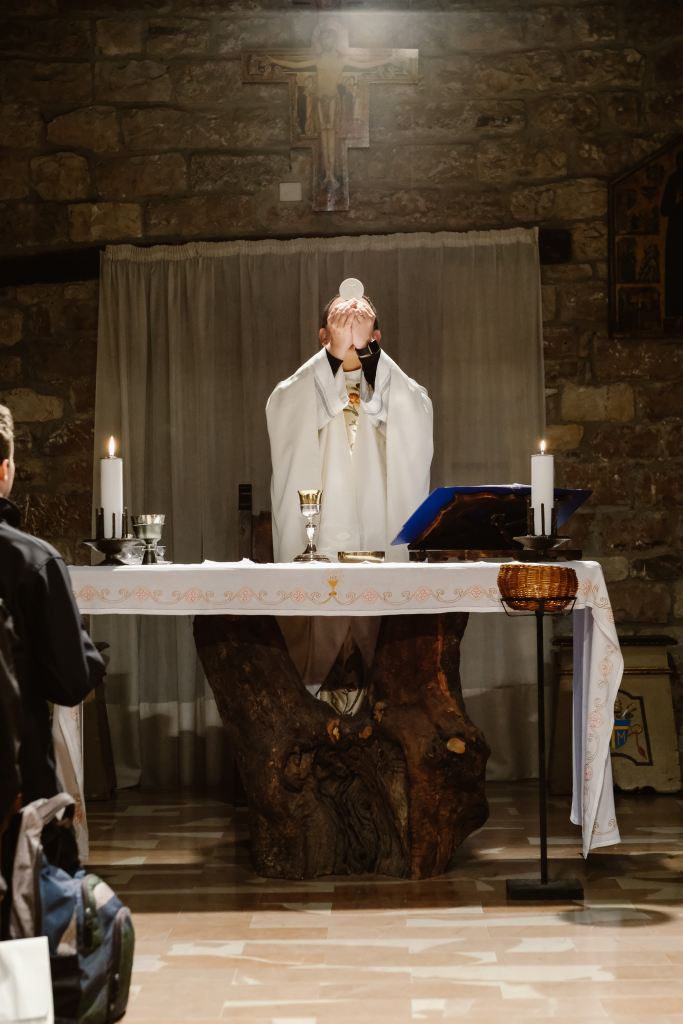
This week’s readings:
- Jeremiah 20:10–13
- Psalm 69:8–10, 14, 17, 33–35
- Romans 5:12–15
- Matthew 10:26–33
Fortunately, I suppose, unlike Jeremiah, I don’t currently “hear the whisperings of many saying . . . “Let us denounce [her] (Jer. 20:10, The New American Bible, 2001 Edition). But at times, I’ve perceived myself as surrounded by such “whisperings.” (Jer. 20:10). Was I more hurt because I felt someone was rejecting me, or because I thought that person was rejecting God? I suspect that more often than not, the answer was the former. “[Z]eal for [God’s] house” doesn’t “consum[e] me” as I assume it did Jeremiah, though Jeremiah isn’t the name given for the narrator of this week’s psalm (Ps. 69:10).
Jeremiah’s emotional response, his anger, is understandable. But in contrast with what Jeremiah seems to request of God, I don’t want God to “take vengeance” on anyone, or to witness anyone taking vengeance on anyone else (Jer. 20:12). After all, the Webster’s New World College Dictionary defines vengeance as “the return of an injury for an injury, in punishment or retribution” I want to see wrongs made right. In the many situations where what’s lost cannot be recovered, I want to see efforts made to prevent the same harm from happening again. I don’t want to see “the return of an injury for an injury in punishment or retribution.”
And even if I had an experience that changed my mind and my heart about vengeance, it wouldn’t bring back what I’d lost. Also, I have a hard time believing that a God whose very nature is a self-emptying love that we humans struggle to imitate would want to take vengeance on people who hurt me. Why? Because God is the source of their lives as well as mine, God wants to remove anything that might distance them from himself. Now that removal might be painful and difficult for a person to go through, just like breaking oneself of a bad habit or putting distance between oneself and toxic people might be extremely hard to do. Still, I wouldn’t think of actions such as these as vengeance. I would consider them lifesaving in the long run. On the other hand, in the long run, the rejection of such life-saving actions would be its own punishment.
It helps me to put the Old Testament passage into perspective if I consider that the words are attributed to Jeremiah. They aren’t attributed to the voice of God. I believe that God speaks to us through the Scriptures, but so do the other people in them. Not everything in the Bible is God’s will because the people whose stories the Bible hands on to us are subject to rash judgment and limited understanding just like we are. I believe Jeremiah is not excluded from these human weaknesses, and that’s why he asks God to let him witness God taking vengeance on the people who persecute him. He’s likely in grave danger, and he wants to get out of it. I would want the same “rescu[e],” were I in his situation (Jer. 20:13). Perhaps the only way he can imagine God alleviating his suffering is for God to take vengeance on the people causing it.
Despite whatever ways Jeremiah’s spiritual vision may be limited, he’s ahead of me in the faith department because he can say, ” . . . Praise the Lord,/for he has rescued the life of the poor/ from the power of the wicked (Jer. 20: 13)!
This declaration is, more often than I would like, difficult to make my own. I hear too often of those with trusting natures being defrauded of their savings by strangers. The world over, the rich get richer while the poor face food insecurity or even famine, and some leaders sacrifice truth and countless lives on the altar of holding onto and increasing their power.
Does “the LORD [hear] the poor,” as the psalm says (Psalm 69:34)? Undoubtedly, but Jesus died not only so that his brothers and sisters could have eternal life through Him but also so that they could have a clearer understanding of their own dignity and live for more than themselves, becoming conduits of His justice and mercy (qualities that are intertwined with each other) generation after generation. It is receiving and sharing these gifts of Christ’s sacrifice that give eternal life to a soul even though a body can be killed. This receiving and sharing also allows Paul to declare, “For if by the transgression of the one, many died, how much more did the grace of God in the gracious gift of the one man Jesus Christ overflow for the many” (Rom. 5:15).
Lord, I often struggle to share Paul’s faith in the gifts you have given me and anyone open to them. And yet, “I do believe; help my unbelief” (Mark 9:24, The New American Bible Revised Edition). Help me to remember that “[e]ven all the hairs on [my] head are counted (Matt 10:30, The New American Bible, 2001, Edition). Everyone’s are. Nothing happens without [our] Father’s knowledge. Even though so much that happens is unpleasant or unjust, the final victory is not doesn’t belong to these events. Guide me as to how to make this truth tangible for myself and for others. Help me and others to be conduits for more of what you are offering us. Amen.
Works cited
Confraternity of Christian Doctrine, Inc. “Sunday 25 June 2023: Readings at Mass.” The New American Bible, 2001. Universalis for Windows, Version 2.179, Universalis Publishing Ltd., 26 Feb. 2023, https://universalis.com/n-app-windows.htm.
The New American Bible Revised Edition, Kindle edition, Fairbrother, 2011.


